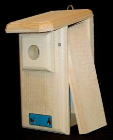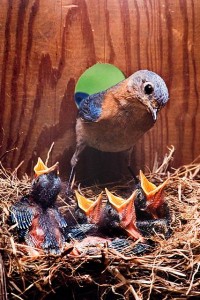- Bird Accessories, Bird Houses, Blue Bird Houses, Bluebird Houses, Recycled Birdhouses, Uncategorized, Wood Birdhouse
Above All, a Blue Bird House Should Be Safe
NABS Approved There are endless designs these days for a blue bird house– from basic nest box to the elaborate and decorative styles. They are made from a wood, recycled plastic, vinyl and even some metal houses claim to be for bluebirds. Of all wild birds, bluebirds require specific housing to successfully raise their brood. An elevated mesh floor for example, helps to protect young chicks from Blowflies. A predator guard will protect against squirrels and woodpeckers from enlarging the entrance hole, while also protect bluebirds and nestlings from cat’s claws, racoon’s claws, and other predators.
The best bet for a safe blue bird house is one which has been approved by the North American Bluebird Society, better known as “NABS”. There are many cedar and recycled plastic houses that are both safe and nice looking with a better success rate of raising bluebird nestlings.
NABS Approved Please look for the NABS Approved logo on your next blue bird house.
-
Add a Bluebird House to Your Yard!
Bluebirds are admired for their beauty, feeding in open areas around houses, and their endearing habit of nesting in man-made boxes. They are one of America’s favorite wild birds. A bluebird house actually comes in two different sizes to accomodate Eastern bluebirds and Western and Mountain Bluebird species. Larger floor space and entrance holes are used for the latter.
Their primary diet consists of insects and fruit. Native plants like Bittersweet will help attract them to your yard. Mealworms are a favorite and an excellent source of protien, especially for mom’s feeding hungry nestlings.
Bluebird populations declined by almost 90% from 1920 – 1970. This was due to loss of habitat and the introduction of non-native species (starlings and house sparrows). You can help the now thriving bluebird population by placing a bluebird house in your yard today!



 Bluebirds are admired for their beauty, feeding in open areas around houses, and their endearing habit of nesting in man-made boxes. They are one of America’s favorite wild birds. A
Bluebirds are admired for their beauty, feeding in open areas around houses, and their endearing habit of nesting in man-made boxes. They are one of America’s favorite wild birds. A